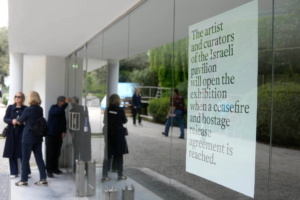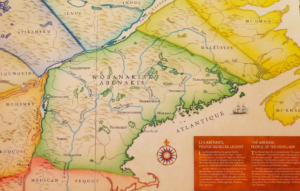Families of the people kidnapped, as well as other supporters light memorial candles during a rally calling for the hostages to be brought home on Oct. 21, on the two-week anniversary of the Hamas attack and kidnapping of hostages on Oct. 7.Alexi J. Rosenfeld/Getty Images
On the night of Oct. 8, the day after the Hamas massacre that killed more than 1,400 people in Israel, I was woken in Vancouver by a knock on a door. “This is it,” I thought. “They’ve come for me.”
“They” were the Hamas terrorists, the latest version of the shadowy Jew-haters – Nazis, previously – that I have feared my whole life, as the child of Holocaust survivors. In recurring nightmares, but also in conscious moments, such as when I allow myself to contemplate what will happen if “never again” becomes “again” – another mass extinction event targeting Jews.
And on that night, Thanksgiving Sunday, roused from a fitful sleep, this was my first very real thought. (What was actually going on: my kid was having a birthday sleepover and it was a friend knocking on his bedroom door.)
I know this imagination-leap sounds ridiculous. But as I wrote in my book about intergenerational trauma, this is where my brain goes, without fail. “Stressful event, Holocaust. Joyful event, Holocaust.” It’s visceral. But an event like an actual massacre of Jews – well, I had never experienced anything like it when I wrote those words.
For many people like me, these irrational fears have been severely triggered by the events of Oct. 7. It wasn’t just the largest number of Jews killed in a single day since the Holocaust – although that would be traumatizing enough – but the horrific way in which civilians including children and babies were murdered.
“When the mind was groping to find what this horribleness was like … very quickly there was a total connection with the Holocaust,” says Yael Danieli, the founder of the International Center for the Study, Treatment and Prevention of Multigenerational Legacies of Trauma, told me this week by phone. “The connections are absolutely unmistakable. Fear for survival, fear of annihilation. The vulnerability, the helplessness.”
Also triggering has been much of the response to the Hamas massacre of Jewish people: synagogues vandalized and, in Tunisia, burned down. In Toronto, pro-Palestinian protestors harassing patrons of a Jewish-owned restaurant. Around the world – in Vancouver, too – we see people tearing down “Missing” posters meant to create awareness of the children who were abducted by Hamas.
This is not just repulsive. For some of us, it is terrifying. Our cellular memory has been activated by current events. The intergenerational trauma in our genes is raging.
French author Anne Berest, whom I interviewed at the Vancouver Writers Fest last week, describes her own intergenerational trauma in The Postcard, a literary sensation about her family’s Holocaust history.
“I carry within me, inscribed in the very cells of my body, the memory of an experience of danger so violent that sometimes I think I really lived it myself, or that I’ll be forced to relive it one day. To me, death always feels near. I have a sense of being hunted.”
Yes, yes, exactly.
Discussion with festival attendees often turned to how scary the world feels right now; one person commented that this moment we are in feels like the early 1930s. That’s a terrible thing for anyone to imagine. But for a Jewish person, it is beyond chilling.
The existential dread is exacerbated by what we’re seeing around us. The antisemitic comments and atrocity denial, the open letters by students at TMU and other universities openly dismissing – and in many cases justifying – the barbarism committed by Hamas.
“It’s what we call the trauma after the trauma,” says Dr. Danieli, a clinical psychologist who works with Holocaust survivors and their children as well as other severely traumatized people around the world. “The judgmental indifference of the onlookers.”
This response has been extremely triggering for people like me, who have spent years imagining what it would have been like had we been born near the beginning of the last century instead of closer to the end. And which of our non-Jewish friends would hide us if it did come to that.
The intergenerational trauma is also affecting Palestinians, who have dealt with displacement, oppression and worse for decades – and, in Gaza, as they are being pummeled by Israeli airstrikes. Gazans “feel as if their lives are this horrible movie that just gets rewound and started all over again,” former CNN foreign correspondent Arwa Damon told NPR.
This war is not merely a triggering event for those of us already suffering. It is an inciting event for people today and future generations of Palestinians and Jews. “Forget everything you thought you knew or you learned about dealing with trauma, because this is different; this is an ongoing event,” Israeli author and clinical psychologist Ayelet Gundar-Goshen told CNN.
So people like me are confronting another one of our worst fears. After working to prevent our inherited trauma from migrating down into the next generation, we see that our children will be suffering from a new event, one that will be remembered – consciously and on the cellular level – long after our own nightmares have ceased.
Follow Marsha Lederman on Twitter: @marshalederman




